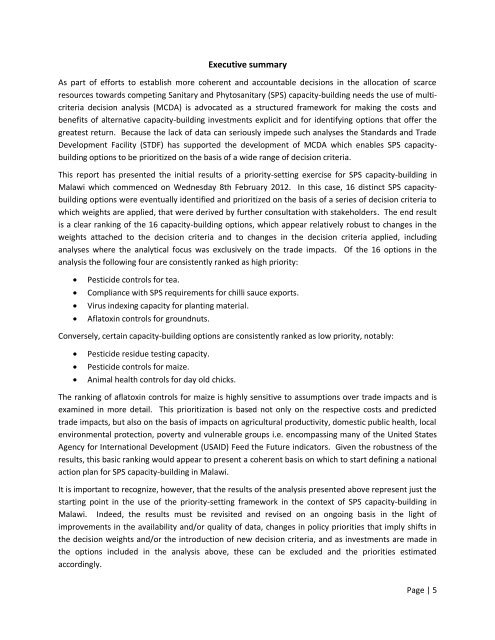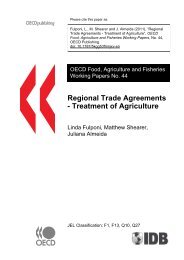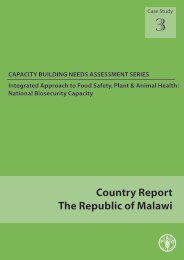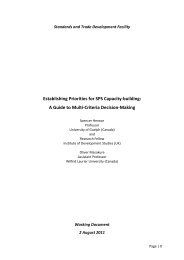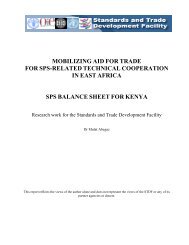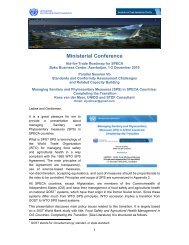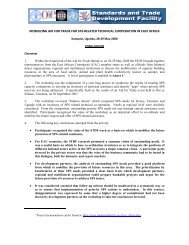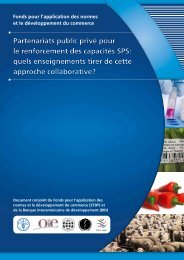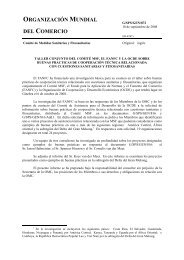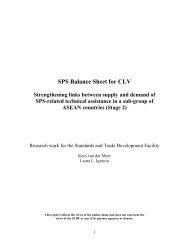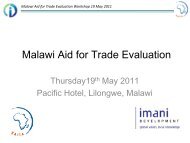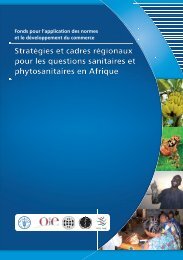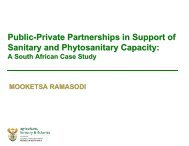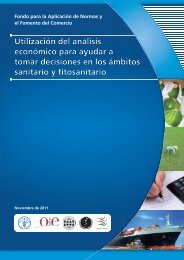MCDA Final Report Malawi - Standards and Trade Development ...
MCDA Final Report Malawi - Standards and Trade Development ...
MCDA Final Report Malawi - Standards and Trade Development ...
Create successful ePaper yourself
Turn your PDF publications into a flip-book with our unique Google optimized e-Paper software.
Executive summary<br />
As part of efforts to establish more coherent <strong>and</strong> accountable decisions in the allocation of scarce<br />
resources towards competing Sanitary <strong>and</strong> Phytosanitary (SPS) capacity-building needs the use of multicriteria<br />
decision analysis (<strong>MCDA</strong>) is advocated as a structured framework for making the costs <strong>and</strong><br />
benefits of alternative capacity-building investments explicit <strong>and</strong> for identifying options that offer the<br />
greatest return. Because the lack of data can seriously impede such analyses the <strong>St<strong>and</strong>ards</strong> <strong>and</strong> <strong>Trade</strong><br />
<strong>Development</strong> Facility (STDF) has supported the development of <strong>MCDA</strong> which enables SPS capacitybuilding<br />
options to be prioritized on the basis of a wide range of decision criteria.<br />
This report has presented the initial results of a priority-setting exercise for SPS capacity-building in<br />
<strong>Malawi</strong> which commenced on Wednesday 8th February 2012. In this case, 16 distinct SPS capacitybuilding<br />
options were eventually identified <strong>and</strong> prioritized on the basis of a series of decision criteria to<br />
which weights are applied, that were derived by further consultation with stakeholders. The end result<br />
is a clear ranking of the 16 capacity-building options, which appear relatively robust to changes in the<br />
weights attached to the decision criteria <strong>and</strong> to changes in the decision criteria applied, including<br />
analyses where the analytical focus was exclusively on the trade impacts. Of the 16 options in the<br />
analysis the following four are consistently ranked as high priority:<br />
<br />
<br />
<br />
<br />
Pesticide controls for tea.<br />
Compliance with SPS requirements for chilli sauce exports.<br />
Virus indexing capacity for planting material.<br />
Aflatoxin controls for groundnuts.<br />
Conversely, certain capacity-building options are consistently ranked as low priority, notably:<br />
<br />
<br />
<br />
Pesticide residue testing capacity.<br />
Pesticide controls for maize.<br />
Animal health controls for day old chicks.<br />
The ranking of aflatoxin controls for maize is highly sensitive to assumptions over trade impacts <strong>and</strong> is<br />
examined in more detail. This prioritization is based not only on the respective costs <strong>and</strong> predicted<br />
trade impacts, but also on the basis of impacts on agricultural productivity, domestic public health, local<br />
environmental protection, poverty <strong>and</strong> vulnerable groups i.e. encompassing many of the United States<br />
Agency for International <strong>Development</strong> (USAID) Feed the Future indicators. Given the robustness of the<br />
results, this basic ranking would appear to present a coherent basis on which to start defining a national<br />
action plan for SPS capacity-building in <strong>Malawi</strong>.<br />
It is important to recognize, however, that the results of the analysis presented above represent just the<br />
starting point in the use of the priority-setting framework in the context of SPS capacity-building in<br />
<strong>Malawi</strong>. Indeed, the results must be revisited <strong>and</strong> revised on an ongoing basis in the light of<br />
improvements in the availability <strong>and</strong>/or quality of data, changes in policy priorities that imply shifts in<br />
the decision weights <strong>and</strong>/or the introduction of new decision criteria, <strong>and</strong> as investments are made in<br />
the options included in the analysis above, these can be excluded <strong>and</strong> the priorities estimated<br />
accordingly.<br />
Page | 5


